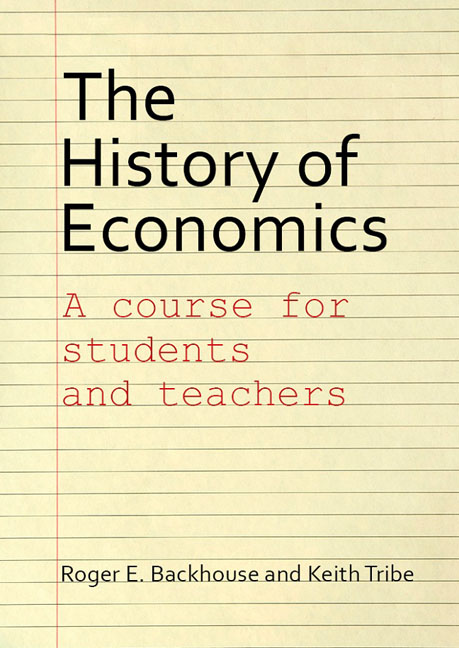Book contents
- Frontmatter
- Contents
- Introduction
- Lecture 1 Commerce, Wealth and Power: The Disputed Foundations of the Strength of a Nation
- Lecture 2 Natural Order, Physiocracy and Reform
- Lecture 3 Adam Smith I: Outline of a Project
- Lecture 4 Adam Smith II: The Two Texts
- Lecture 5 The Political Economy of Malthus and Ricardo
- Lecture 6 Political Economy in Continental Europe and the United States
- Lecture 7 Political Economy, Philosophic Radicalism and John Stuart Mill
- Lecture 8 Popular Political Economy: List, Carey, Bastiat and George
- Lecture 9 Radical Political Economy: Marx and His Sources
- Lecture 10 Marginalism and Subjectivism: Jevons and Edgeworth
- Lecture 11 From Political Economy to Economics
- Lecture 12 Alfred Marshall’s Project
- Lecture 13 Markets and Welfare after Marshall
- Lecture 14 Monetary Economics
- Lecture 15 The Rise of Mathematical Economics
- Lecture 16 Robbins’s Essay and the Definition of Economics
- Lecture 17 John Maynard Keynes
- Lecture 18 Quantitative Economics
- Lecture 19 The Keynesian Revolution
- Lecture 20 Modern Macroeconomics
- Lecture 21 Inflation and the Phillips Curve
- Lecture 22 Popular Economics
- Lecture 23 Economics and Policy
- Lecture 24 Ideology and Place
- Index
Lecture 5 - The Political Economy of Malthus and Ricardo
Published online by Cambridge University Press: 09 August 2023
- Frontmatter
- Contents
- Introduction
- Lecture 1 Commerce, Wealth and Power: The Disputed Foundations of the Strength of a Nation
- Lecture 2 Natural Order, Physiocracy and Reform
- Lecture 3 Adam Smith I: Outline of a Project
- Lecture 4 Adam Smith II: The Two Texts
- Lecture 5 The Political Economy of Malthus and Ricardo
- Lecture 6 Political Economy in Continental Europe and the United States
- Lecture 7 Political Economy, Philosophic Radicalism and John Stuart Mill
- Lecture 8 Popular Political Economy: List, Carey, Bastiat and George
- Lecture 9 Radical Political Economy: Marx and His Sources
- Lecture 10 Marginalism and Subjectivism: Jevons and Edgeworth
- Lecture 11 From Political Economy to Economics
- Lecture 12 Alfred Marshall’s Project
- Lecture 13 Markets and Welfare after Marshall
- Lecture 14 Monetary Economics
- Lecture 15 The Rise of Mathematical Economics
- Lecture 16 Robbins’s Essay and the Definition of Economics
- Lecture 17 John Maynard Keynes
- Lecture 18 Quantitative Economics
- Lecture 19 The Keynesian Revolution
- Lecture 20 Modern Macroeconomics
- Lecture 21 Inflation and the Phillips Curve
- Lecture 22 Popular Economics
- Lecture 23 Economics and Policy
- Lecture 24 Ideology and Place
- Index
Summary
Aims of the lecture
1. To demonstrate that the English political economy developed by Robert Malthus and David Ricardo in the early 1800s radically truncated the framework laid out by Adam Smith’s Wealth of Nations, reducing political economy to a set of abstract principles about value, price and distribution.
2. To show that the analytical framework constructed in the early 1800s was in part a response to the dual shocks of war and population increase in a predominantly agrarian economy.
3. To show that the more coherent this analytical framework became, the less useful it was as a means of accounting for developments in the contemporary economy; and that attention was increasingly directed to the former rather than the latter.
Bibliography
E. A. Wrigley, Poverty, Progress and Population (Cambridge: Cambridge University Press, 2004), especially chapters 6 and 8, is the most useful starting point for our purposes here in understanding the economic transformation of Britain in the later-eighteenth/early-nineteenth century. Rather than focus on an “Industrial Revolution” that often involves an overestimation of the nature and rate of change from an agrarian to an industrial economy, Wrigley emphasizes developments in population, subsistence and energy use.
Much commentary on English political economy tends to overlook its discontinuity with previous arguments about land, labour and wealth, and sometimes imputes a consistency to it borrowed from twentieth-century economic methodology. The best introduction to English political economy remains therefore Edwin Cannan’s Theories of Production and Distribution in English Political Economy from 1776 to 1848 (London: P. S. King & Son, 1893). Cannan wrote in opposition to Alfred Marshall’s tendency to emphasize the continuity of his thinking with Ricardo; the result is a bracingly sceptical account of political economy, founded on Cannan’s wide reading of French and English economic literature from the eighteenth and early nineteenth centuries.
John Pullen’s Oxford Dictionary of National Biography entry is the most reliable point from which to start with Malthus, while for his various writings, The Works of Thomas Robert Malthus, eight volumes, E. A. Wrigley and David Souden (eds) (London: Pickering, 1986) is the most convenient source.
- Type
- Chapter
- Information
- The History of EconomicsA Course for Students and Teachers, pp. 77 - 94Publisher: Agenda PublishingPrint publication year: 2017



